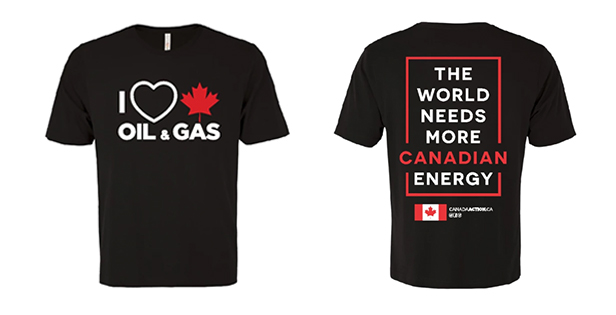Product Hub September 26, 2019
T-shirt Controversy Leads to More Sales for Alberta Organization
A provocative T-shirt design is benefiting a grassroots organization in Alberta.
In two recent instances, visitors to Parliament Hill in Ottawa report being turned away by security after they were told their T-shirts were “offensive” and “too political,” respectively.
The imprint in question: Pro-energy “I Love Canadian Oil and Gas” screen prints.

The T-shirts are sold by Canada Action, an Alberta-based organization that supports Canada's natural resources industry, including oil and gas.
Earlier this month, oilpatch executive William Lacey from Calgary says he was stopped from joining a tour of the Senate chamber by a security guard citing his “offensive” shirt as the reason. And last week, Calgarians Chris Wollin and Mallory Hartviksen weren’t allowed to enter the House of Commons because of what they were told was overly political apparel. All three visitors were wearing the same T-shirt.
The reported incidents have been a boon for Canada Action, the purveyors of the shirts. The Alberta-based grassroots organization supports the country’s natural resources like oil and gas, and has seen a marked boost in sales since the reports from Parliament Hill.
“It’s definitely skyrocketed with all of the national attention,” Cody Battershill, head of Canada Action, told the Calgary Herald. “We saw an exponential increase from the first incident, and then there was the second one. We’re getting as many orders from Ontario and the East as anywhere else. Some days, we get up to 100 orders from our online store.”
In addition to the T-shirts, Canada Action sells hoodies, headwear, stickers and decals, drinkware, license plate frames and flags with the same message. The recent controversy over the T-shirts goes to show that products that communicate a user’s particular stand on a divisive issue can lead to healthy sales when devotees of a particular cause are moved to take action and show their support.
Environmental issues have divided Canada in recent years, with much attention centered on the oil fields in Alberta, Saskatchewan and British Columbia. According to the Canadian Association of Petroleum Producers, Canada is the fifth-largest producer of natural gas and the sixth-largest producer of crude oil in the world. However, the country doesn’t have the pipeline capacity needed to store and distribute it efficiently, as a result of ongoing political and environmental wrangling.
As a result, Western Canada has been selling oil at discounted prices because of the lack of access, resulting in lost revenue. In June, Prime Minister Justin Trudeau announced his approval of expansion to the Trans Mountain oil pipeline between the Alberta tar sands and the British Columbia coast. Despite continued squabbling between energy proponents, environmentalists and indigenous communities, construction of the pipeline looks to be on track, with the arrival last week of of 550 kilometers (340 miles) of pipe at stockpile sites in British Columbia and Alberta.
#DYK: The #TransMountain Expansion Project will require approximately 318,000 metric tons of new pipe!
— Trans Mountain (@TransMtn) September 23, 2019
More than 55% of it has already has arrived at stockpile sites in BC & Alberta. https://t.co/ZfQKLsgO9c #TMX #pipelines pic.twitter.com/jiB7yos0ON

Product Hub
Find the latest in quality products, must-know trends and fresh ideas for upcoming end-buyer campaigns.
